In March 2025, Olena Tsyhipa worked in Brussels together with the Civilians in Captivity non-governmental organization, at the invitation of the Front Line Defenders international human rights organization.
“When the whole world is cut off from you, every word is like a ray of hope.”
Relatives of journalists held in russian captivity are convinced that silence is dangerous and publicity is a weapon that helps fight for their liberation.
Information Service of the National Union of Journalists of Ukraine (NUJU) spoke with people directly involved in this problem to understand which strategy for the fight for the liberation of civilian prisoners is the most effective.
“Publicity helps more than it harms.”
Olena Tsyhipa, the wife of Ukrainian public figure and journalist from Nova Kakhovka, Serhii Tsyhipa, who was illegally sentenced to 13 years in prison by the russians, is convinced that publicity is a key factor in the fight for the release of prisoners.
“From my own experience, I can say that it is necessary to keep the focus on civilians and journalists in russian captivity. It is necessary to constantly remind society, state authorities, and the international community that these people were fulfilling their professional duty or helping others at the call of their hearts,” Olena emphasizes.
She does not hide that sometimes publicity can create certain difficulties, but the benefits far outweigh them.
“While working on publicizing the case of my husband, Serhii Tsyhipa, I did everything possible to ensure that he was not forgotten and remembered,” Olena said. “And I will continue to do so on all possible platforms.”
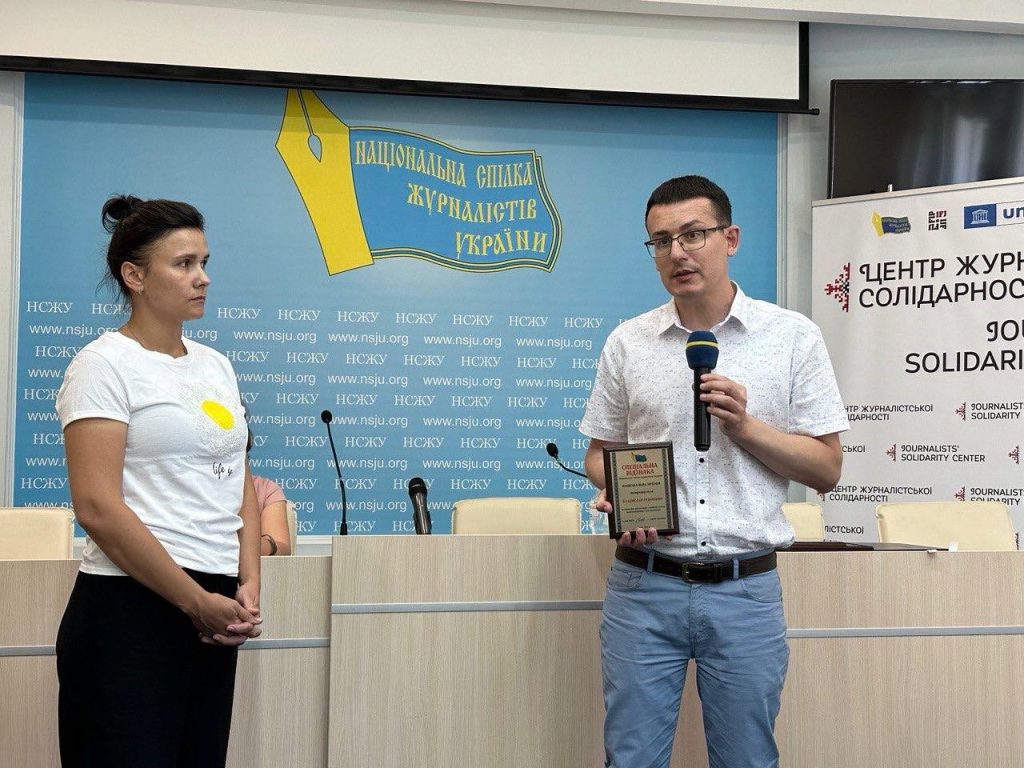
“It gives them inspiration and hope.”
Especially valuable are the testimonies of people who themselves went through captivity. National Union of Journalists of Ukraine (NUJU) Secretary Valerii Makeyev, who spent 100 days in russian captivity, talks about the critical importance of communication with the outside world for prisoners.
“For a person who is in captivity, it is extremely important to know that they are remembered,” Valerii emphasizes. “This is not even discussed. It is one hundred percent. Every leaflet, every leaflet that gets there through censorship, even with crossed out lines – is extremely important.”
He shares the touching story of a Ukrainian serviceman who was captured in the first days of a full-scale invasion.
“When, two years later, due to certain circumstances, he had the opportunity to write a message on a piece of paper that he was alive and describe how everything had happened, it was perceived with tears in his eyes. It was vital for him to let people know that he was alive and for his family to receive this news,” says Valerii Makeyev. “Those people who are there must remember that they are remembered and loved here.
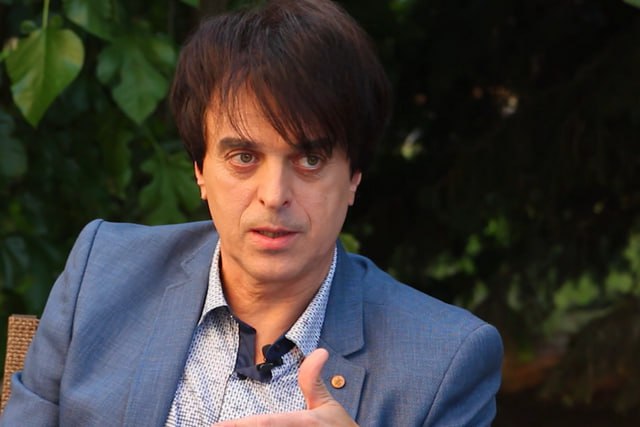
Editor of the Melitopol edition of RIA-Pivdennyi, Svitlana Zalizetska, emphasizes that it is publicity that often helps to establish contact with prisoners.
“After I visited Strasbourg, people contacted me, and in this way, we found one of our civilian prisoners. This happened only after the news spread,” Svitlana noted.
She says that relatives of prisoners often ask to remember the names of prisoners themselves.
“I was approached by the relatives of another civilian prisoner, by the way, our journalist colleague Vlad Hershon, with a request to remember his name. Because it is also a hope for the prisoner himself to know that he has not been forgotten, this inspires him, an understanding that they are fighting for him,” says Svitlana.
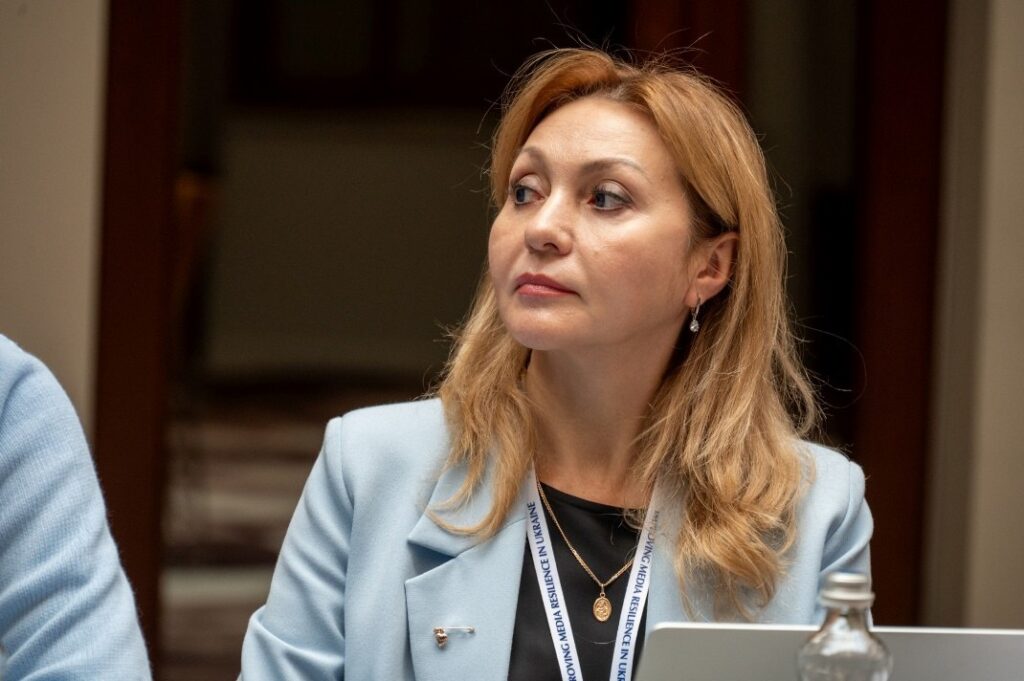
Six civilians are being held captive from occupied Melitopol: Heorhii Levchenko, Iryna Levchenko, Anastasiya Hlukhovska, Vladyslav Hershon, Yana Suvorova, and Yevhen Ilchenko.
“The large number of civilian prisoners from Melitopol is connected with the powerful resistance that people are putting up. If they wanted to cooperate with the occupiers, they would live peacefully under occupation,” says Svitlana Zalizetska.
“We need to act very carefully.”
At the same time, Valerii Makeyev emphasizes the need for a balanced approach to publicity.
“There are two approaches to whether to write about journalists in captivity or not. In my case, publicity definitely helped. The attitude of those people who were around me changed because they understood the resonance of the case,” says Valerii.
However, he notes that the situation can be ambiguous.
“Today, we know a lot of harsh, cruel, inhuman relationships between those people who hold our prisoners and civilians, including journalists. As for me, it depends only on a very specific schedule whether it is necessary to speak or not,” notes Makeyev. “In those relationships that are available to me today, I try to avoid publicity regarding communication with a certain person who is in captivity. And even when the person returns, be very careful to make some publicity so as not to harm those who remain there.”
Speaking of the possibilities of relatives contributing to the release of prisoners, Valerii Makeyev notes that every relative and friend in their specific situation knows dozens of times more than what an expert can say.
He understands the desperation of relatives who are ready to use any channels to obtain information.
“Relatives are ready to communicate, forgive me, even with the devil, even with God, to reach their son or husband, or at least get some news,” says the secretary of the NUJU.
At the same time, he warns against fraudulent schemes.
“I do not like communications that begin with messages like “We know that we can help.” And as soon as the conversation about money comes up (“just send it, and we will solve everything then”) – then you can hang up,” says Valerii Makeyev. “Here the commandment that is for doctors – “do not harm,” – it applies to everyone who is involved in this case today.”
Support should be constant
Olena Tsyhipa confirms the importance of support for the prisoners themselves.
“When my husband had an appeal in Moscow, and we managed to organize the presence of diplomats from four EU countries, it really encouraged him,” said Olena. “He wrote to me in a letter that he had hope that he would eventually gain freedom.
According to Olena, it is especially important for her husband to know that work is constantly being done for his release in freedom.
“He is very pleased that I do this all the time and remind him of him on various platforms, including international ones,” emphasized Olena Tsyhipa.
As the experience of relatives of prisoners and people who had survived captivity themselves, shows, publicity, and support are critically important. Publicity helps not only draw attention to the fate of specific prisoners but also gives them the most valuable thing – hope and understanding that they have not been forgotten and continue to fight for them.
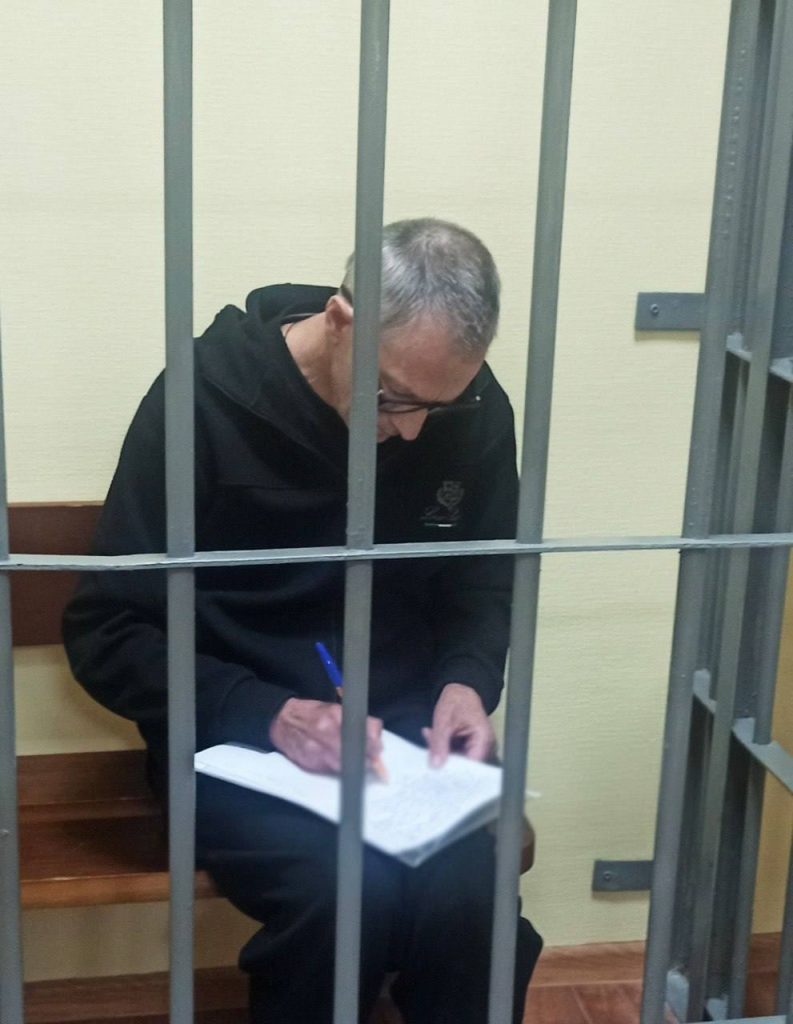
“According to the NUJU, 31 media workers are in captivity,” Sergiy Tomilenko.
The President of the NUJU, Sergiy Tomilenko, emphasizes the scale of the problem and the need for consolidated action.
“According to verified data from the NUJU, as of today, at least 31 civilian media workers are in russian captivity. Each of them has the right to freedom, and our duty is to use all possible tools for their release,” emphasizes Sergiy Tomilenko.
The union continues to insist on the importance of publicly discussing their fates, mentioning their names, and documenting all cases of illegal detention of media representatives. We call on international organizations, human rights defenders, and diplomatic missions to pay special attention to these cases and facilitate the return of our colleagues home.
The russian authorities must know that every captured journalist is not just a name on a list but a person whose fate is under the close attention of the Ukrainian and international community.
Ukrainian civilian journalists held captive by the russian federation:
- Oleksii Bessarabov, Ukrainian journalist and political analyst, former serviceman of the Ukrainian Navy. He lived in Sevastopol, worked as a correspondent for the publication Glavred, collaborated with the analytical center Nomos, and was deputy editor-in-chief of the magazine Chornomorska Bezpeka. He was detained by the FSB on November 9, 2016, on charges of sabotage and terrorist activities. He was subjected to electric shock torture. On April 4, 2019, on a clearly falsified case, he was sentenced to 14 years in prison in a maximum-security colony.
- Volodymyr Dudka, former Ukrainian military sailor, safety engineer, and political analyst, collaborated with the magazine Black Sea Security. He was detained by the FSB on November 9, 2016, on charges of sabotage and terrorist activities. He was subjected to electric shock torture. On April 4, 2019, he was sentenced to 14 years in prison in a maximum-security colony on a clearly falsified case.
- Dmytro Shtyblykov, Ukrainian journalist, reserve officer of the Armed Forces of Ukraine, head of international programs at the Nomos analytical center, and deputy editor-in-chief of the magazine “Black Sea Security.” He was detained by the FSB on November 9, 2016, on charges of sabotage and terrorist activities. In May 2017, under duress and threats against family members, he entered into a pre-trial agreement, pleading “guilty.” On November 16, 2017, he was sentenced to 5 years in prison to be served in a strict regime colony. On November 8, 2021, when he was supposed to be released, he was arrested on charges of “high treason” and was remanded in custody.
- Ernes Ametov, a citizen journalist, actively covered human rights violations in the occupied Crimea. He was arrested on October 11, 2017, on charges of participating in the Muslim organization Hizb ut-Tahrir, recognized as a “terrorist” in russia. On September 16, 2020, he was acquitted, but the appeals court overturned the acquittal on March 14, 2022. On December 29, 2022, he was sentenced to 11 years in prison.
- Marlen Asanov (Suleiman), photographer, popularizer of Crimean Tatar culture, and citizen journalist, actively covered searches and trials. He was arrested on October 11, 2017, on charges of his participation in the Muslim organization Hizb ut-Tahrir, recognized as a “terrorist” in russia. He was sentenced to 19 years in prison in a maximum-security colony. Due to the conditions of detention and the long stay in the penal colony, he often gets sick.
- Timur Ibragimov, a citizen journalist, actively covered human rights violations in the occupied Crimea. He was arrested on October 11, 2017, on charges of participation in the Muslim organization Hizb ut-Tahrir, recognized as a “terrorist” in russia. He was sentenced to 17 years in prison in a maximum-security colony. He has the third group of disability; he has an eye implant that has long been due for replacement.
- Seyran Saliyev, a citizen journalist, actively covered searches and trials. He was arrested on October 11, 2017, on charges of participating in the Muslim organization Hizb ut-Tahrir, recognized as a “terrorist” in russia. He was sentenced to 15 years of imprisonment in a maximum-security colony.
- Server Mustafayev, a human rights activist, one of the organizers and coordinators of Crimean Solidarity, citizen journalist, conducted systematic monitoring of the situation in Crimea and covered politically motivated trials in the media. He was arrested on May 21, 2018, on charges of participating in the Muslim organization Hizb ut-Tahrir, recognized as a “terrorist” in russia. He was sentenced to 14 years of imprisonment in a maximum-security colony. He filed a number of lawsuits about the seizure of his Quran and personal belongings, the lack of adequate medical care, and other violations by the management of “correctional” institutions.
- Ruslan Suleymanov, a citizen journalist, covered human rights violations in occupied Crimea. He was arrested on March 27, 2019, on charges of participating in the Muslim organization Hizb ut-Tahrir, recognized as a “terrorist” in russia. He received a sentence of 14 years of imprisonment in a maximum-security colony.
- Rustem Sheykhaliyev, a citizen journalist, covered human rights violations in occupied Crimea, primarily “trials.” He was arrested on March 27, 2019, on charges of participating in the Muslim organization Hizb ut-Tahrir, recognized as a “terrorist” in russia. Despite serious illnesses (chronic pyelonephritis, prolapse of the right kidney, varicose veins in the legs), received a sentence of 14 years of imprisonment in a maximum-security colony.
- Remzi Bekirov, citizen journalist correspondent for Grani.ru, covered high-profile cases against Crimean Tatars in occupied Crimea. He was arrested on March 28, 2019, on charges of participating in the Muslim organization Hizb ut-Tahrir, recognized as a “terrorist” in russia. He was sentenced to 19 years in prison in a maximum-security colony.
- Osman Arifmemetov, writer, winner of literary competitions, and citizen journalist, actively covered searches and trials and helped make programs in pre-trial detention centers for unjustly convicted Crimean Tatars. He was arrested on March 28, 2019, on charges of participating in the Muslim organization Hizb ut-Tahrir, recognized as a “terrorist” in russia. He was sentenced to 14 years in prison in a maximum-security colony.
- Vladyslav Yesypenko, journalist of the Krym.Realii project of Radio Liberty. He was arrested on March 10, 2021, after filming the laying of flowers at the monument to T. Shevchenko in Simferopol the day before; for a month, relatives did not know what happened to him. Initially accused of espionage and later of storing and transporting an explosive device. He was subjected to electric shock torture and death threats. He was sentenced to 5 years in a general regime colony. The case of Vladyslav Yesypenko, in fact, became a “methodology” for fabricating cases against other journalists. Winner of the 2022 Ihor Liubchenko National Prize for the Protection of Freedom of Speech.
- Amet Suleymanov, a citizen journalist, covered human rights violations in occupied Crimea. He was arrested on March 12, 2020, on charges of participating in the Muslim organization Hizb ut-Tahrir, recognized as a “terrorist” in russia. Despite a serious heart disease (doctors recommended replacing the mitral valve), he was sentenced to 12 years in prison in a maximum-security colony. He was under house arrest, and after the sentence came into force (from April 5, 2023) – in prison. He is being held in conditions that contribute to the exacerbation of his illness.
- Asan Akhtemov, Crimean journalist, correspondent and assistant editor of the newspaper Avdet. He was detained on September 3, 2021, on charges of blowing up a section of a gas pipeline near Simferopol. He was subjected to torture and psychological pressure from FSB officers. Despite the obvious falsification of “evidence,” he was sentenced to 13 years in prison in a maximum-security colony.
- Dmytro Khyliuk, a journalist for UNIAN, was captured by russian military personnel on March 3, 2022, at his parents’ home in the village of Kozarovychi, Vyshhorod District, Kyiv Region. No official charges have been brought against him. According to an investigation by Reporters Without Borders, as of July 2023, he was sentenced in one of the correctional institutions of the Vladimir region of the russian federation.
- Serhii Tsyhipa, a public figure and journalist from Nova Kakhovka, detained on March 12, 2022, on charges of espionage by the decision of the occupation Simferopol “court” on October 6, 2023, received a 13-year prison term. On February 14, 2024, the appeal “court” upheld this sentence.
- Iryna Danylovich, a Crimean nurse, trade union public activist, and citizen journalist of the Crimean Process. She was kidnapped in Koktebel on April 29, 2022, held in a basement, and was subjected to torture and intimidation. She was accused of manufacturing and storing an improvised explosive device. She was sentenced to 7 years in prison. In prison, her health deteriorated significantly; she is losing her hearing and suffered a stroke. Due to the lack of medical care, she declared a dry hunger strike.
- Yevhen Ilchenko, administrator of the Melitopol Telegram channel Myly Topol,” was detained on July 10, 2022, and deported to russia.
- Vilen Temeryanov, a citizen journalist and later a journalist for the publication Grani.ru, actively covered human rights violations in the occupied Crimea. He was arrested on August 11, 2022, on charges of participating in the Muslim organization Hizb ut-Tahrir, recognized as a “terrorist” in russia. In prison, he was subjected to forced psychiatric examination; in addition, the journalist’s eyesight deteriorated sharply. As of April 2024, the verdict has not yet been rendered.
- Iryna Levchenko, a journalist from Melitopol and a veteran of journalism, was detained on May 6, 2023, together with her husband, Oleksandr. It is not known for certain what she is accused of and where she is being held.
- Heorhii Levchenko, administrator of the Telegram channel RIA Melitopol, was arrested by the FSB in Melitopol on August 1, 2023, as a “Ukrainian terrorist,” which was recorded in a russian propaganda video. The journalist is being held in Mariupol.
- Anastasiya Hlukhovska, before the full-scale invasion, a journalist for the publication “RIA Melitopol,” was arrested by the FSB in Melitopol on August 1, 2023, which was recorded in a russian propaganda video. It is not known where she is being held.
- Vladyslav Hershon, administrator of the chat room Melitopol Is Ukraine, was detained on August 1, 2023. His relatives were informed about his detention two and a half months later.
- Yana Suvorova, administrator of the Telegram channel Melitopol Is Ukraine. He was detained by the russian occupiers in Melitopol on August 1, 2023. Together with other administrators, he was accused of terrorism, espionage, and cooperation with Ukrainian special services. It is unknown where he is being held.
- Oleksandr Malyshev, administrator of the Telegram channel Melitopol Is Ukraine. He was detained by the russian occupiers in Melitopol on August 1, 2023. Together with other administrators, he was accused of terrorism, espionage, and cooperation with Ukrainian special services. It is unknown where he is being held.
- Maksym Rupchev, administrator of the Telegram channel Melitopol Is Ukraine. He was detained by the russian occupiers in Melitopol on August 1, 2023. Together with other administrators, he was accused of terrorism, espionage, and cooperation with Ukrainian special services. It is unknown where he is being held.
- Mark Kaliush, administrator of the Telegram channel Melitopol Is Ukraine. He was detained by the russian occupiers in Melitopol on August 1, 2023. Together with other administrators, he was accused of terrorism, espionage, and cooperation with Ukrainian special services. It is unknown where he is being held.
- Rustem Osmanov, a citizen journalist, covered human rights violations in the occupied Crimea. He was arrested on March 5, 2024, on charges of participating in the Muslim organization Hizb ut-Tahrir, recognized as a “terrorist” in russia. The russian “Kyivskyi District Court” of Simferopol chose a preventive measure of detention for him for two months.
- Aziz Azizov, a citizen journalist, covered human rights violations in the occupied Crimea. He was arrested on March 5, 2024, on charges of participating in the Muslim organization Hizb ut-Tahrir, recognized as a “terrorist” in russia. The russian “Kyivskyi District Court” of Simferopol chose a preventive measure of detention for him for two months.
- Hennadii Osmak, a journalist from Henichesk, former editor-in-chief of the publication “New Visit.” On March 12, 2022, he announced the termination of his work in the media. On March 7, 2024, it became known about his detention for “participation in an illegal military group” (“popularization of the terrorist battalion named after Noman Chelebidzhikhan”). He faces 15 years in prison.
There is also information about a journalist who was captured while serving in the ranks of the Defense Forces of Ukraine:
Vasyl Filimon, a cameraman of the Mykolayiv branch of the Public Broadcasting Service, was drafted into the ranks of the Armed Forces of Ukraine. On May 15, 2022, he was captured by the military occupation forces of the russian federation while performing a combat mission in the Donetsk Region.
NUJU Information Service

 THE NATIONAL UNION OF
JOURNALISTS OF UKRAINE
THE NATIONAL UNION OF
JOURNALISTS OF UKRAINE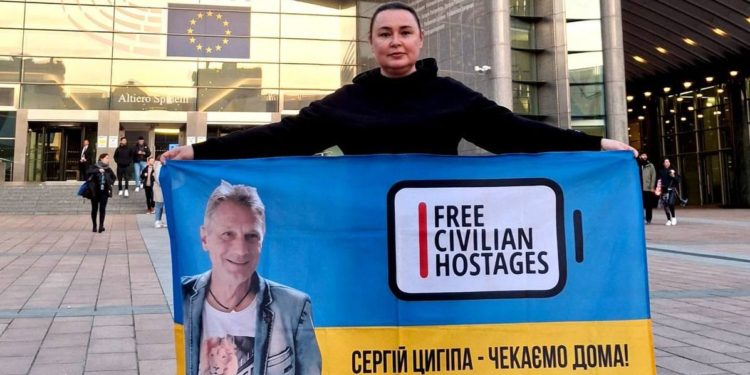
















Discussion about this post